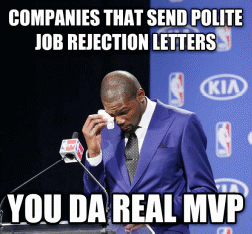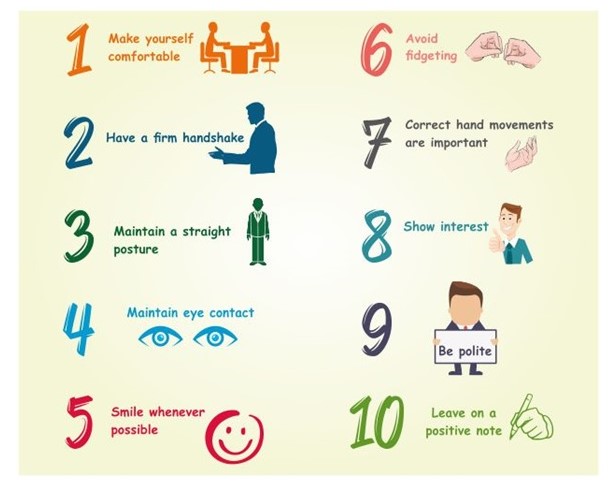A few months ago, I was passionate about seeking tips for job seekers who wanted to pass interviews successfully and attract potential employers’ attention. In the process of surfing and filtering information, I, as usual, went on YouTube and found a fascinating and partially humorous video uploaded by National Geographic. In this video, Brian Brushwood, an American comedian, and lecturer promise to give the public some valuable advice and tell the secrets of how to get a dream job and leave a good impression on a future employer (National Geographic 00:00:12-00:00:16). After watching the video, I thought about the words of the comedian and paid attention to the fact that many people were not aware of why they failed working interviews and would not receive invitations to respected posts. As a result, I have developed a list of recommendations that might help applicants in finding a job and gaining the trust of HR specialists.
Firstly, preparing for a job interview is a responsible task. In his recommendations, Mr. Brushwood advises paying attention to special gymnastics that allows one to relax the body and reduce the level of excitement (National Geographic 00:00:40-00:00:50). However, in addition to such exercises, appropriate theoretical preparation is an indispensable aspect of a successful interview. A job seeker should be aware of the basic requirements for a particular job and understand what an employer wants from him or her. Consider the following scenario: a tidy and polite person comes for an interview and cannot answer an HR specialist’s elementary questions about what, according to the requirements of a particular organization, the corresponding position is. Is this outcome potentially a failure for such a job seeker? Probably yes because companies tend to look for an employee with a clear working position and understanding of what an employer wants from him or her. Therefore, before warming up before entering the office, one should study the basic requirements that apply to a specific position.
Secondly, each applicant should be prepared for any outcome of the interview, regardless of the degree of professional or personal work qualifications. Many people look for work for weeks and months and get dozens of failures. Consequently, the idea that a company hires an employee immediately after a successful interview is erroneous. It is not enough to hit an HR specialist with natural charm or impeccable knowledge of the theory since several applicants may apply for one vacant position. One should take into account that rejection is no less an incentive than hiring. Companies that treat applicants with respect, as a rule, send detailed reasons for refusing to provide jobs. In Figure 1, a suitable meme is displayed, which proves this claim (Job Rejection Letters).

Thirdly, one should not try to reveal all one’s abilities and talents to an HR specialist at the first interview. Certainly, everyone has the right to one moment of fame. Nevertheless, excessive zeal and determination can alert a potential employer who may not be ready for such an active position as a future employee. There is a more effective method: react but do not fantasize; respond but do not interrupt. Imagine you are seeing a doctor who is interested in your complaints or progress in treatment. This is a much more familiar and understandable situation, isn’t it? You are both equal, and each of you plays a role. Therefore, before reflecting on what talents and stories to impress a future employer, one should rather concentrate on professional experience but not on the psychology of a people person.
Finally, as potentially effective and logical tips, one should note special body language principles. Despite the individuality of each interview, there are corporate standards of conduct that are essential for applicants to consider. For example, an HR specialist will be puzzled if his or her interlocutor hides one’s eyes, expresses indifference to the conversation, or allows familiarity. A welcoming atmosphere is created by both participants in the interview, and this rule is unchanged for any situation. In Figure 2, the corresponding hints are displayed, which can be useful when applying for a job and creating the mode of social interaction that will not contradict the standards of business communication (Net_User).

Given the above recommendations, a key conclusion can be made: when applying for a job, a working interview should be conducted following the principles of business interaction, the preparedness of an applicant, and his or her compliance with relevant behavioral norms. The tips provided by National Geographic can help get rid of excitement and increase self-confidence. However, in addition to self-discipline, a job seeker needs the necessary professional background to interest an employer and identify oneself as a socially competent and highly qualified specialist. The suggested tips can be used during almost any interview. I intend to supplement this list as I become familiar with this topic, and I will be glad to hear additional rules that should be observed.
Works Cited
“Job Rejection Letters.” LiveMeme, 2020. Web.
“Winning the Interview | Hacking the System.” YouTube, uploaded by National Geographic, 2015, Web.
Abramova, Sofia, et al. “Speech Behavior and Multimodality in Online Communication among Teenagers.” KnE Social Sciences, 2020, pp. 75-83.
Izmaylova, Guzel A., et al. “Linguistic and Social Features of Slang.” International Journal of Scientific Study, vol. 5, no. 6, 2017, pp. 75-78.
Net_User. “Simple Body Language Tips for Your Next Job Interview.” Net HR, 2017. Web.
Slaughenhaupt, Makenna. “Slang and Social Media.” The Valhalla Voice, 2018, Web.
Yoga Suryanto, G. “The Use of Slang Words by Gamers in the Game Online.” Language Horizon, vol. 4, no. 1, 2016, pp. 1-8.